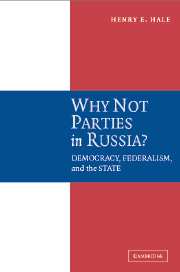Book contents
- Frontmatter
- Contents
- Acknowledgments
- 1 Electoral Markets and Russia's Political Smorgasbord
- 2 Party Entrepreneurship in Russia's Electoral Market 1989–2005
- 3 How Much Party Is in the Party System?
- 4 Electoral Markets and Party Substitutes in Russia : Origins and Impact
- 5 Parties and Party Substitutes : Determining the Balance
- 6 Conclusion : The Market Model and Theories of Parties, National Integration, and Transitions from Authoritarian Rule
- References
- Index
6 - Conclusion : The Market Model and Theories of Parties, National Integration, and Transitions from Authoritarian Rule
Published online by Cambridge University Press: 06 July 2010
- Frontmatter
- Contents
- Acknowledgments
- 1 Electoral Markets and Russia's Political Smorgasbord
- 2 Party Entrepreneurship in Russia's Electoral Market 1989–2005
- 3 How Much Party Is in the Party System?
- 4 Electoral Markets and Party Substitutes in Russia : Origins and Impact
- 5 Parties and Party Substitutes : Determining the Balance
- 6 Conclusion : The Market Model and Theories of Parties, National Integration, and Transitions from Authoritarian Rule
- References
- Index
Summary
The model of electoral markets introduced in Chapter 1 has thus provided us with the intellectual tools to solve the puzzle Russia has posed to comparative theories of party system development. In post-Soviet Russia, parties have stubbornly failed to dominate the political system for nearly a decade and a half, although the state has more recently pushed through a set of reforms that enhance the role of parties in Russian politics. The key has been to think of parties as one kind of producer of goods and services that can help candidates win votes in elections and to think of candidates as the consumers of these goods. Market theory shows that the degree to which one supplier dominates the market is not purely a function of the supply and demand for that supplier's particular products, but that its market share also depends on the availability of substitutes for these goods. This volume has identified multiple kinds of political organization that can function as party substitutes, ranging from the nonpartisan governors' political machines in Russia to political action committees in the twentieth-century United States. Whether parties successfully dominate a political system, closing out the country's electoral market, thus hinges critically on factors that affect the balance between parties and party substitutes in a country. Some important such factors are found to be historical legacies and transition paths that influence the relative quality and volume of political capital available to parties and substitutes.
- Type
- Chapter
- Information
- Why Not Parties in Russia?Democracy, Federalism, and the State, pp. 235 - 248Publisher: Cambridge University PressPrint publication year: 2005



